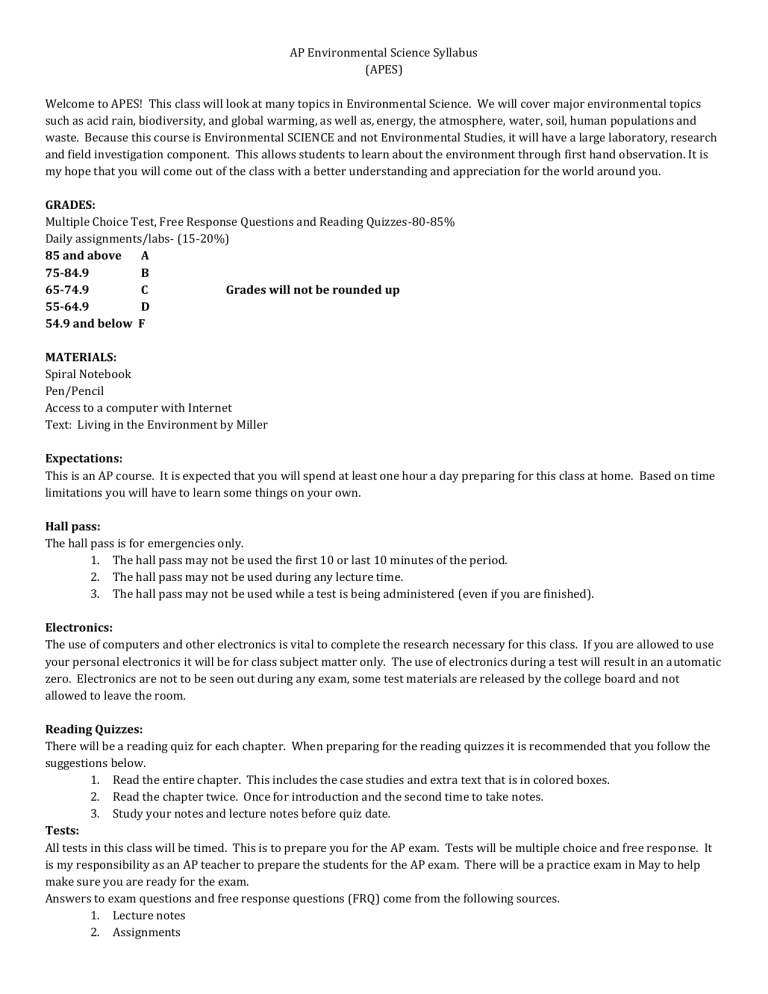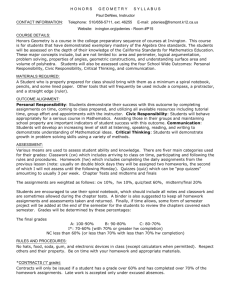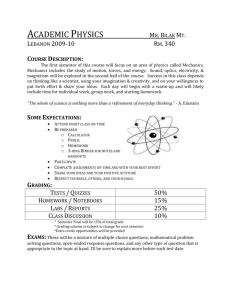AP Environmental Science Syllabus (APES) Welcome to APES! This

AP Environmental Science Syllabus
(APES)
Welcome to APES! This class will look at many topics in Environmental Science. We will cover major environmental topics such as acid rain, biodiversity, and global warming, as well as, energy, the atmosphere, water, soil, human populations and waste. Because this course is Environmental SCIENCE and not Environmental Studies, it will have a large laboratory, research and field investigation component. This allows students to learn about the environment through first hand observation. It is my hope that you will come out of the class with a better understanding and appreciation for the world around you.
GRADES:
Multiple Choice Test, Free Response Questions and Reading Quizzes-80-85%
Daily assignments/labs- (15-20%)
85 and above A
75-84.9 B
65-74.9 C
55-64.9 D
Grades will not be rounded up
54.9 and below F
MATERIALS:
Spiral Notebook
Pen/Pencil
Access to a computer with Internet
Text: Living in the Environment by Miller
Expectations:
This is an AP course. It is expected that you will spend at least one hour a day preparing for this class at home. Based on time limitations you will have to learn some things on your own.
Hall pass:
The hall pass is for emergencies only.
1.
The hall pass may not be used the first 10 or last 10 minutes of the period.
2.
The hall pass may not be used during any lecture time.
3.
The hall pass may not be used while a test is being administered (even if you are finished).
Electronics:
The use of computers and other electronics is vital to complete the research necessary for this class. If you are allowed to use your personal electronics it will be for class subject matter only. The use of electronics during a test will result in an automatic zero. Electronics are not to be seen out during any exam, some test materials are released by the college board and not allowed to leave the room.
Reading Quizzes:
There will be a reading quiz for each chapter. When preparing for the reading quizzes it is recommended that you follow the suggestions below.
1.
Read the entire chapter. This includes the case studies and extra text that is in colored boxes.
2.
Read the chapter twice. Once for introduction and the second time to take notes.
3.
Study your notes and lecture notes before quiz date.
Tests:
All tests in this class will be timed. This is to prepare you for the AP exam. Tests will be multiple choice and free response. It is my responsibility as an AP teacher to prepare the students for the AP exam. There will be a practice exam in May to help make sure you are ready for the exam.
Answers to exam questions and free response questions (FRQ) come from the following sources.
1.
Lecture notes
2.
Assignments
3.
The book
4.
Videos
Make up tests, FRQs and quizzes:
All make up test are to be done on your time and you have exactly 5 school days to make up a missed exam. After 5 days you will receive a zero. Make ups can be done before school, at nutrition or lunch. Please arrange a time with me so I will be in the classroom. Remember taking a test and lunch will limit your time so it is best not to miss and exam.
Notes: (All lecture notes are on line)
All lecture notes are on line for student access. For success the following suggestions should be followed.
1.
Print notes before the unit begins.
2.
Before the day of lecture read through the notes and highlight important parts and write questions for things that are confusing or unclear.
3.
The day of lecture, follow along during discussion and add anything new to the notes. If your questions or confusion is not cleared up, ask for clarification.
4.
The night after lecture, re-write the notes focusing on the important facts.
Assignments: (All assignments are on line. A class copy will be available to use during class time)
All assignments are to be kept in a spiral notebook. For credit all assignments must be done according to the list below:
1.
All assignments must be complete and on time. Late and incomplete work will receive a zero.
2.
All assignment must have a date and title and the top of the page. Each assignment will start and the top of a new page.
3.
All assignment must be done in complete sentences, all data tables and graphs must be complete and all questions must be answered. If you get stuck you can use: a.
Your notes b.
The book c.
The internet d.
Each other. Your classmates may be your best resource so use them.
Supplemental materials:
It is highly recommended that you buy and use an AP exam preparation book. It is best to buy it early and use it all year.
Below are some suggested books:
1.
The Princeton Review: Cracking the AP Environmental Science Exam
2.
Cliff Notes: AP Environmental Science
3.
Barron’s: AP Environmental Science
4.
Do not get the AP Environmental Crash Course. It is a waste of money.
Semester topics:
Semester one:
Human populations: chapter 6 and 5-3
Terrestrial ecology: chapter 3, 7. 10 and 5-4
Aquatic ecology; Chapter 8, 11 and 13
Soil: Chapter 12
Pesticides: Chapter 17
Biodiversity: Chapter 4, 5 and 9
The final:
Semester two:
Waste management: Chapter 21
Energy: Chapter 14, 15, and 16
Water pollution: Chapter 20
Air pollution and global warming: Chapter 18 and 19
Review
Final (200 points)
The final will cover the entire year. This final is mandatory for students not participating in the AP exam. It is optional for any student who signs up the takes the AP exam in May.
Print your name: ______________________________________________ Signature: _______________________________________________ Date: ____________
Parent or guardian signature: _________________________________________________





